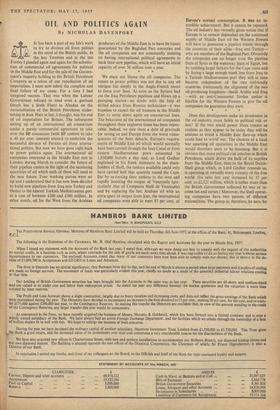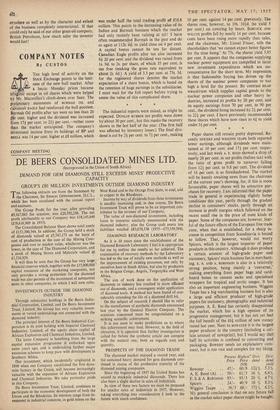OIL AND POLITICS AGAIN
By NICHOLAS DAVENPORT IT has been a part of my life's work to try to divorce oil from politics in the mind of the British public. In the late Twenties and in the late Forties I pleaded again and again for the substitu- tion of commercial oil agreements for political in the Middle East and for the sale of the Govern- ment's majority holding in the British Petroleum Company as a token of our repudiation of oil imperialism. I must now admit the complete and final failure of my cause. For a time 1 had imagined success. That was when the Labour Government refused to send even a gunboat (much less a Sixth Fleet) to Abadan on the nationalisation of the British Petroleum under- taking in Iran. Here at last, I thought, was the end of oil imperialism for Britain. The subsequent setting up of an international oil consortium under , a purely commercial agreement to take over the BP concession (with BP content to take a 40 per cent, interest) seemed to underline the successful divorce of Persian oil from interna- tional politics. But now we have gone right back to power politics again. The international oil companies interested in the Middle East met in London during March to consider the future of their pipeline outlets in the light of the increasing quantities of oil which each of them will need in the near future. Four working parties were set up and I understand that it has now been decided to build new pipelines from Iraq into Turkey and thence to the nearest Turkish Mediterranean port at a cost of between £20.0 and £300 million. In other words, oil for the West from the Arabian
producers of the Middle East is to have its transit guaranteed by the Baghdad Pact countries and the oil companies are not unnaturally insisting on having international political agreements to back their new pipeline, which will have an initial capacity of over 50 million tons a year.
We must not blame the oil companies. The return to power politics was not due to any oil intrigue but simply to the Anglo-French resort to force over Suez. As soon as the Syrians had cut the Iraq Petroleum pipelines and blown up a pumping station—no doubt with the help of skilled advice from Russian technicians—it was hopeless to expect the oil business in the Middle East to settle down again on commercial lines. The behaviour of the international oil companies throughout these explosive times has been impec- cable. Indeed, we owe them a debt of gratitude for saving us and Europe from the worst conse- quences of the Suez debacle. Europe's require- ments of Middle East oil which would normally have been carried through the Suez Canal or from eastern Mediterranean ports amounted to 1,850,000 barrels a day and, as Lord Godber explained in his frank statement to the share- holders of Shell, the tankers available could only have carried half that quantity round the Cape. But by re-routing their tankers to the west and rapidly boosting the output of Venezuela (par- ticularly that of Compania Shell de Venezuela) and by replacing the lost Arabian oil with an extra spurt of output from Iran, the international oil companies were able to meet 85 per cent. of
Europe's normal consumption. It was an in- credible achievement. But it cannot be repeated. The oil industry has virtually given notice that if Europe is to remain dependent on the continued supply of Middle East oil the Western Powers will have to guarantee a pipeline transit through the countries of their allies—Iraq and Turkey— who are members of the Baghdad Pact. Obviously the companies can no longer trust the pipeline State of Syria or the waterway State of Egypt, but by building larger tankers for the Cape route and by laying a large enough trunk line from Iraq to a Turkish Mediterranean port they will in time become independent of the two unfriendly countries. Fortunately the alignment of the two oil-producing kingdoms—Saudi Arabia and Iraq —with, an anti-Communist Jordan makes it feasible for the Western Powers to give the oil companies the guarantee they want.
Does this development make an investment in the oil industry more liable to political risk or less? If the two world power blocs remain as realistic as they appear to be today they will be anxious to avoid a Middle East flare-up which could lead to world 'war. The chances of a local war upsetting oil operations in the Middle East would therefore seem to be lessening. But it is obvious that more political risk attaches to British Petroleum, which draws the bulk of its supplies from the Middle East, than to the Royal Dutch- Shell group which, as Lord Godber reminds us, is operating in virtually every country of the free world. (Its sales last year increased by 15 per cent. to £2,321 million, which is rather more than the British Government collected by way of in- come tax and surtax.) Moreover, the Shell operat- ing companies have two parents of different nationalities. The group is, therefore, he says, by
structure as well as by the character and exieni of the business completely international. If that could only be said of our other great oil company, British Petroleum, how much safer the investor would feel!



































 Previous page
Previous page